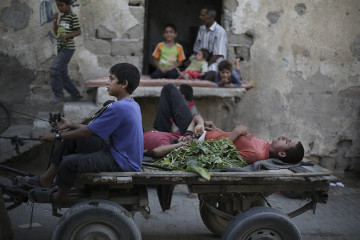

"Sometimes I wake up and think my dreams have come true. But then I remember that I live in Gaza," sighs Yousef Almassri, a recent graduate of IT.
"Today Gaza is like a graveyard. Israel has crushed our hopes and dreams, and finding work is nearly impossible. There's no peace, no employment, and nothing good to hold onto."
Before the war started, Yousef had his heart set on a career in IT. "I love the world of apps and working with clients around the world. In a place like Gaza, remote working is often the best option," Yousef explains. "But now even freelancing is impossible."
"What am I guilty of? Is it because I'm a Palestinian born in Gaza?"
More than 200,000 jobs in Gaza have been lost since Israel's onslaught began, leaving Yousef and many others deeply worried about their future. "My livelihood has come to a grinding halt," says Youssef, the sadness evident on his face. "There hasn't been steady electricity for more than five months. I haven't even charged my laptop."
Gaza forced to go offline
Internet connection remains unreliable across the Gaza Strip with frequent internet and communication blackouts. Such instability has rendered Yousef's IT skills useless. "IT freelance work used to be a major source of income for my family due to my father's low salary and my brother's tuition fees. Now we lack any means of support and no help to meet our needs.
"How can I support my family members who are dying before my eyes? If we're not killed by the bombs, we'll die from a lack of food," Yousef sobbed, tears flooding down his cheeks.
Feeling guilty about not leaving Gaza
Alaa Badah, a third-year pharmacy student, lives a stone's throw away from Yousef. And like her neighbour, Alaa is deeply concerned about her future and is filled with guilt and regret.
"Three years ago, my aunt's husband suggested that I marry his son who lives in a different country and continue my studies," Alaa told The New Arab.
"I turned him down as I wanted to finish my studies in Gaza. But staying here has ended up being an awful decision. I still feel so guilty, even though I don't want to live away from my parents or leave my country."
In Gaza, when one conflict comes to a close another opens, forcing students like Alaa to focus on staying financially afloat and alive rather than studying or being creative. Israeli bombs have already flattened Alaa's university campus, killing professors and destroying her department's facilities.
Left with a sour taste
Mahmoud Matouq, the owner of the now-destroyed Matouq's restaurant in Gaza, wistfully recalls the sights and sounds of his packed establishment. "I still remember the way the shadow of the restaurant would be illuminated by different colours. It was a popular restaurant going back generators and visitors used to have a good time. Now these memories haunt me."
Israel's five-month assault on Gaza not only targets so-called military installations but also civilian infrastructure, with business owners like Mahmoud losing everything he has. In Gaza, where over 50% of Palestinians lack a source of income, such devastation quickly scuppers the Gazan's aspirations.
"They set fire to my restaurant and they burned my soul along with it. "What am I guilty of? Is it because I'm a Palestinian born in Gaza?" Mahmoud sighed, his voice tinged with hopelessness.
Eman Alhaj Ali is a Gazan-based journalist, writer, and translator from the Al-Maghazi Refugee Camp
Follow her on X: @EmanAlhajAli1




 Follow the Middle East's top stories in English at The New Arab on Google News
Follow the Middle East's top stories in English at The New Arab on Google News


